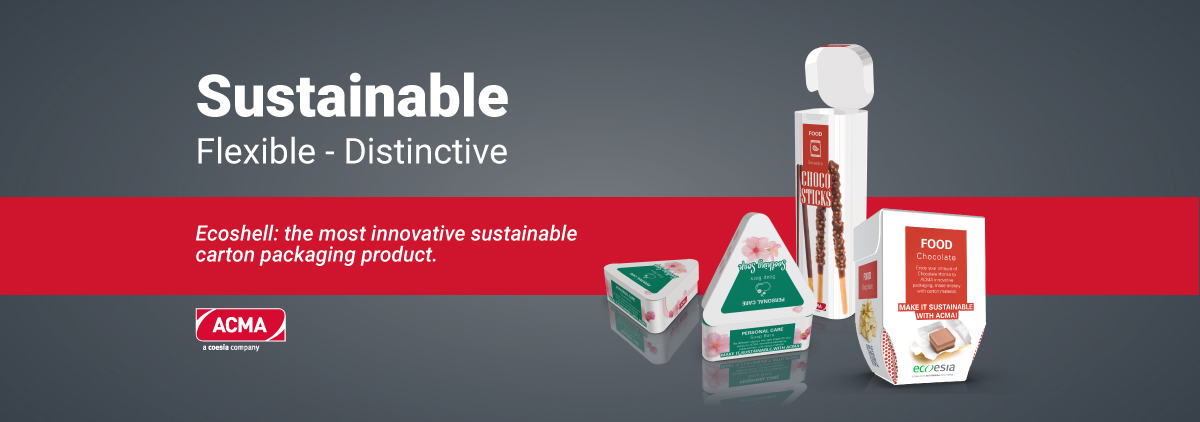Disruptive innovation in cardboard packaging: here comes Ecoshell
The global shift from plastic to paper
According to McKinsey, the demand for cardboard packaging is expected to steadily grow over the next decade, especially due to convenience and sustainability concerns associated with plastic[1]. A new global report from The Economist Intelligence Unit, commissioned by the WWF, shows a 71% rise in Google searches for sustainable goods globally since 2016[2]. Some are even wondering if cardboard packaging could replace plastic[3]. And, no wonder, anti-single-use-plastic regulation is accelerating this transition[4]. For all these reasons, innovation is key for industry players to survive and create value for millions of customers worldwide.
Ecoshell, a plastic-free pack
Ecoshell is the most innovative sustainable carton packaging product by ACMA. It was selected as one of the finalists of the 2020 Packaging Oscar and also at the 2021 Sustainability Awards. Created for the confectionery industry, Ecoshell has many advantages over competing solutions, as it is:
- Sustainable
- Highly recognizable on the shelf
- Customizable and flexible
- Convenient and healthful to use
Sustainable
Ecoshell is entirely made of sustainable cardboard, a renewable source. Plastic, on the other hand, comes from fossil fuels, which account for an estimated 4.5 million deaths per year and an economic loss of 2.9 trillion dollars, or 3.3% of global GDP[5]. Unlike plastic, paper is biodegradable and very easily recycled[6]. Also, since the structure of Ecoshell is based on flat blank cartons, it is inherently more space-saving than plastic. As a result, it takes fewer runs to be transported compared to plastic jars, resulting in a lower carbon footprint, reduced logistics costs and a more energy-efficient supply chain.
Highly recognizable on the shelf
Shape can influence purchase choices[7]. That’s why a compelling element of Ecoshell is its innovative and unique design. Traditionally, candies and gums, which are Ecoshell's primary use cases, come in plastic boxes with regular shapes. By contrast, Ecoshell is a complete novelty. Its eye-catching, patented shape is a breath of fresh air for consumers, making it stand out even on the most crowded shelves.
Customizable and flexible
Today, Ecoshell can be used in several industries, including food, parapharmaceuticals, cosmetics and personal hygiene. How come a packaging solution is so adaptable? The reason is the flexibility of ACMA's forming and filling technology, which is just one of the several technologies available in ACMA packaging machine portfolio.
Thanks to Ecoshell's patented technology, the shape and size of the package can be designed according to the customer's needs. Indeed, Ecoshell’s format can easily be customized to fit a vast array of applications such as:
- Snacks (chips, biscuits, etc.)
- OTC (food supplements)
- Personal hygiene (cotton buds, toothpaste tablets, soap bars, etc)
- Cosmetics (lipsticks, creams, etc)
This is crucial in today's market, where the option to adapt to a sudden market shift is invaluable.
Convenient and healthful to use
A striking peculiarity of Ecoshell is its unit-dose system. Ecoshell is a suitable solution to ration different types of product, enabling a more hygienic use as well - a very important factor given that, as of today, hygiene is now a top priority for shoppers[8]. Not only is this packaging feature more convenient, but it also represents a significant advantage, especially for food manufacturers looking for a packaging solution that supports more hygienic habits.
In conclusion, Ecoshell is the pinnacle of ACMA’s sustainable innovation in cardboard packaging. Respect for the environment, convenience, hygiene and a stylish, flexible design are the pillars of this groundbreaking packaging solution that keeps growing relentlessly year over year.
If you want to know more, please get in touch. We are more than happy to help you reach your sustainable development goals.



